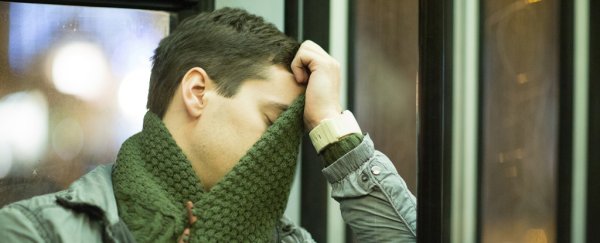Being a night owl is a fact of biology, not a choice.
But unfortunately, it comes with a range of health risks.
These include cardiovascular disease, higher rates of obesity and smoking, psychiatric disorders, and an overall 10 percent increased risk for death, according to a study newly published in the journal Chronobiology International.
We all have an internal body clock, known as a chronotype or circadian rhythm, that determines when we feel most awake or sleepy.
This is what defines night owls, larks - morning people - and those who fall in between, and this rhythm has a significant effect on how our bodies function.
This new study is one of the most extensive to see how much of a role chronotype has on risk for death and other health conditions.
The researchers behind the study took a look at 504,642 people aged between 37 and 73 from the UK Biobank cohort. They initially assessed study participants between 2006 and 2010 and followed up on those people in an average of 6.5 years.
To figure out whether participants identified as a morning person or night owl, the study authors asked people if they were more of or definitely a morning person or if they were more of or definitely an evening person - and gave them a "don't know" option as well.
Asking people about their chronotype is a great way of assessing a person's body clock, with a very strong correlation to the major questionnaire or quiz researchers use to tell what a person's body clock is.
(Most people know whether they are a morning person, night owl, or somewhere in between.)
Out of the 433,268 people that answered the chronotype question and provided sufficient health data, 27 percent were definite morning types, 35 percent moderate morning types, 28 percent moderate evening types, and 9 percent definite evening types.
Along with the 10 percent increased risk of death compared to definite morning types, the more people identified as evening people, the greater their risk for a variety of medical conditions.
Definitive night owls had almost double the risk of suffering from psychological disorders, about a 30 percent increased risk for diabetes, a 25 percent increased risk for neurological conditions, 23 percent increased risk for gastrointestinal disorders, and a 22 percent increased risk for respiratory disorders.
Why being a night owl takes a toll
This is an incredibly large group of people to study and this is the first time a population has been studied with the intention of assessing how chronotype affects mortality from the start.
The big question to ask is why having a preference for sleeping in takes such a toll on health.
Most researchers agree that a large part of what defines your chronotype is genetic - both whether you are more of a morning person or night person and how much you have the ability to shift that "preference."
In the study, the researchers say that estimates are that between 21 percent and 52 percent of what determines chronotype has genetic roots.
Most people can change their chronotype to at least some extent, especially if they are careful about light exposure, otherwise we'd never be able to adjust to a new time zone.
But overall, the tendency to feel more alert and alive in the morning or evening remains, no matter how much people try to change it.
One of the main reasons researchers think evening people tend to have these health conditions is that their body clocks aren't properly aligned with society.
There's probably a variety of evolutionary reasons for a preference for night to exist, but many of these needs may not correspond with the demands of the modern industrial world.
Everything from work time to meal time occurs at a time that doesn't feel right for night owls, a state that researchers call "social jetlag".
Generally, if people prefer to go to bed later and wake up later on days they don't have to work, they're probably suffering from at least some degree of social jetlag.
Since it's only possible to shift body clocks so much, the authors of the study suggest that flexible work schedules that accommodate different body clocks could improve health - and probably productivity as well.
Teenagers tend to naturally have later chronotypes (body clocks shift throughout life and most teens are night owls), and a growing body of research has shown that shifting school start times later improves school performance.
That's been shown in the US and also recently demonstrated in a new study out of Singapore.
Getting some rest when your body wants it can improve your health - and probably your life, too.
This article was originally published by Business Insider.
More from Business Insider:
